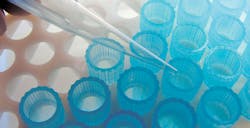The American Cancer Society (ACS) estimated that 1.6 million people would be diagnosed with cancer and more than 500,000 would die from the disease in 2015.1 ACS also projects that almost 40 percent of men and women will be diagnosed with cancer at some point in their lifetime. With cancer having such an impact on society, it makes sense that cancer research has focused on developing more effective treatment options. Resistance to anticancer drugs, however, is a leading contributor to death in cancer patients.2 Here is a brief review of how biomarker research is addressing that problem and revolutionizing cancer management.
Drug resistance: one size does not fit all
The standard of care for cancer patients has been a combination of systemic drugs, surgery, and/or radiation. Yet treatment may or may not work, based on a number of factors. For this reason, scientists have been trying to decode and understand cancer in hopes of developing more advanced diagnostic techniques and being able to offer more effective treatment options. Until relatively recently the knowledge base and technology needed to understand the molecular processes behind cellular resistance to treatment was simply not available.
The emergence of genome-wide fields of study such as proteomics (the study of proteins encoded in genes) and pharmacogenomics (the study of individual genetic variations in drug response) are bridging that gap. Using new advances in technology and information learned from human genome mapping,3 researchers are beginning to have a better understanding of cancer cell biology, as well as some intrinsic resistance mechanisms.
In addition to increased understanding of the molecular pathogenesis of various cancer types, information on how a person’s genes affect his or her response to drugs has been instrumental in the development of targeted treatment strategies. Targeted therapies increase the efficacy of medication by targeting specific biomarkers while reducing the toxicity associated with systemic treatments.
Predicting treatment resistance
Biomarker identification is an essential element of personalized cancer medicine. Identification is achieved by testing the patient’s tumor tissue, blood, or other body fluids for the presence or expression of certain molecules. Once a specific biomarker or genetic mutation is detected in the patient’s tumor, the information obtained is used to predict treatment effectiveness.4
Biomarker research has shed light on the genetic variations and resistance mechanisms of cancerous cells: what triggers their uncontrolled proliferation, what fuels their self-sustaining capabilities, and what makes them immune to apoptosis (programmed cell death). This information has been used for the design of “smart drugs,” often used in addition to chemotherapy, which target specific cell growth factors—proteins involved in signaling pathways—and inhibit factors that promote angiogenesis (formation of blood vessels to support tumors). Targeted drugs work by suppressing key activities necessary for cellular division and differentiation.5-7
For colorectal cancer patients, for example, tumor testing for KRAS mutation, a gene that stimulates cell growth as a downstream effector of the activated EGFR (epidermal growth factor receptor) signal, has become a standard prior to using EGFR antibody therapy.4 Up to 40 percent of colorectal cancer tumors have a detected KRAS gene mutation. Patients with wild type (i.e., normal) KRAS genes may or may not respond to such therapies, depending on alternative resistance mechanisms.8-12 Therefore, it is imperative to determine the patient’s KRAS mutation status prior to selecting EGFR antibody therapy as a choice.
In the case of melanoma, about 50 percent of cases have mutations in the BRAF gene. BRAF, a protein kinase that helps activate the RAS/MAPK pathway, is important for cell division, growth, and differentiation.13 A mutated BRAF gene in cells can potentially make normal cells turn cancerous by signaling the cells to grow and divide at abnormal rates. Treating melanoma BRAF mutation-positive patients with a targeted therapy agent, such as Vemurafebib, helps inhibit the mutated BRAF gene function. In turn, this will increase treatment effectiveness.
Biomarkers and the lab
Understanding cancer’s pathogenicity and multiple pathways for cell growth, division, and treatment resistance at a molecular level remains a complex goal for researchers. However, the potential benefits to patients more than justify the effort, one which will only increase as the theories and practices of personalized medicine move increasingly into the clinical realm.
Laboratory testing will play a vital role in aiding physicians to select the most appropriate treatment for patients. Expect more biomarker testing to enter the clinical laboratory as more biomarkers are discovered and translated to clinical practice.
References
- Siegel RL, Miller KD, Ahmedin. Cancer Statistics, 2015. CA Cancer J. Clin. 2015;65:5–29.
- Holohan C, Van Schaeybroeck S, Longley DB, Johnston PG. Cancer drug resistance: an evolving paradigm. Nature Reviews Cancer. 2013;13:714–726.
- National Cancer Institute. Biorepositories and Biospecimen Research Branch. FAQs—NCI and biorepositories. http://www.biospecimens.cancer.gov/patientcorner/faq.asp. Accessed December 31, 2015.
- Heinemann V, Douillard JY, DuCreux M, Peeters M. Targeted therapy in metastatic colorectal cancer—an example of personalized medicine in action. Cancer Treatment and Reviews. 2013;39(6):592-601.
- Abramson, R. Overview of Targeted Therapies for Cancer. http://www.mycancergenome.org/content/molecular-medicine/overview-of-targeted-therapies-for-cancer. Accessed December 31, 2015.
- Cancer Support Community. Targeted cancer treatment. www.cancersupportcommunity.org/MainMenu/About-Cancer/Understanding-Cancer/New-Discoveries/Targeted-Cancer-Treatment.html. Accessed December 31, 2015.
- Urruticoechea A, Alemany R, Balart J et al. Recent Advances in Cancer Therapy: an overview. Current Pharmaceutical Design. 2010; 16:3-10.
- Ness SM. Mayo Clinic. Living with cancer blog. Biomarkers help define individual cancer treatment. http://www.mayoclinic.org/diseases-conditions/cancer/expert-blog/biomarkers-and-cancer-treatment/bgp-20110350. Accessed December 31, 2015.
- Tan C, Du X. KRAS mutation testing in metastatic colorectal cancer. World J
Gastroenterol. 2012;18(37):5171–5180. - Gottesman, MM. Mechanisms of cancer drug resistance. Annual Review of Medicine. 2002;53:615-627.
- Shaib W, Mahajan R, El-Rayes B. Markers of resistance to anti-EGFR therapy in colorectal cancer. J Gastrointest Oncol. 2013;4(3):308–318.
- Medscape. Colorectal cancer and KRAS/BRAF. http://emedicine.medscape.com/article/1690010-overview. Accessed December 31, 2015.
- Ascierto PA, Kirkwood JM, Grob JJ et al. The role of BRAF V600 mutation in
Melanoma. J of Transl Med. 2012;10:85.


